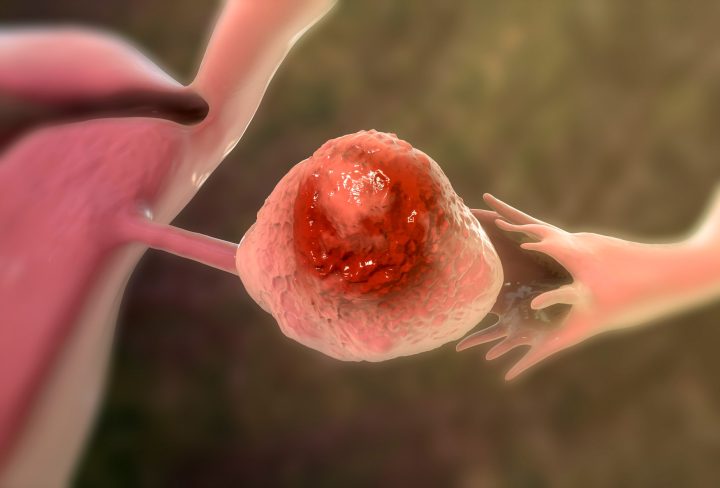Ovarian cancer develops when abnormal cells multiply and grow out of control in the ovary. Ovaries are female reproductive organs, one on each side of the uterus (womb), that produce eggs and female hormones.
Ovarian cancer occurs mostly in women of 50 to 65 years and sometimes runs in families. If left untreated, the tumor can spread to other parts of the body.
Symptoms of Ovarian Cancer
Many symptoms of ovarian cancer resemble other medical conditions and differ among individuals.
Common symptoms are:
- Abdominal bloating
- Loss of appetite
- Gas, indigestion, and nausea
- Diarrhea, constipation, or frequent urination
- Fatigue
- Bleeding from the vagina
- Fluid build-up around the lungs and abdomen
- Obstruction of the digestive tract
Causes of Ovarian Cancer
There cause of ovarian cancer is still unclear, but there are certain factors that increase the risk, like:
- Age (over 50 Years)
- Changes in the genes
- Family history of ovarian, breast, or bowel cancers
- Certain fertility drugs
- Obesity
- Infertile or having a first child after 35 years
- Early onset of periods (before 12 years) and late menopause
- Hormonal therapies
Ovarian cancer can also develop without having any of these risk factors.
Diagnosis of Ovarian Cancer
Your doctor may suggest tests or scans to look for cysts, tumors, or other changes. These may include:
- Physical examination – To check for any lumps and perform an internal vaginal examination
- Blood tests – To check for a tumor marker which is increased in case of ovarian tumor
- Pelvic ultrasound – To check for pictures of your ovaries and uterus
- CT scan – To check for the spread of cancer
- PET scan – To check abnormal tissues in the body
- Biopsy – Only test to confirm the diagnosis of cancer
Treatment of Ovarian Cancer
Treatment for ovarian cancer involves surgery, chemotherapy, or a combination of treatments.
Surgery
Surgery is the primary option for treating ovarian cancer, as this is most effective in removing as many cancer cells as possible from the body.
If cancer has spread to all the reproductive organs, the surgeon removes them.
Chemotherapy
Chemotherapy is another effective way to treat ovarian cancer left in the body even after surgery. The surgeon injects powerful chemicals into the body intravenously or directly into the abdomen in case of ovarian cancer.
Targeted Therapy
Targeted therapy uses new oral or intravenous medications to stop the spread of cancer cells.
Targeted drug treatments attack specific weaknesses in the cancer cells and can cause them to die.
Hormone therapy
Hormone therapy uses drugs to block the effects of the estrogen hormone on ovarian cancer cells.
This is the treatment option for slow-growing ovarian cancers.
Radiation therapy
Radiation therapy is the use of high-energy x-rays to destroy leftover cancer cells. Radiotherapy helps to shrink secondary tumors that have developed in other parts of the body and are causing pain or other symptoms.
Prevention of Ovarian Cancer
There are no proven ways to eliminate your risk of developing ovarian cancer. However, certain factors can lower your risk of developing ovarian cancer, including:
- Stick to a healthy diet (high in fruits, vegetables, and grains and low in saturated fat)
- Maintain healthy weight
- Early screening for ovarian cancer (in case of family history)
- Use birth control pills
- Get pregnant and choose to breast-feed
Nutrition for Ovarian Cancer
A balanced and well-nourished diet will increase the strength to fight ovarian cancer.
The following foods help to gain extra amount of calories and proteins,
- Fresh fruits and vegetables (especially carrots, oranges, and sweet potatoes)
- Dairy products (cheese and milk)
- Eggs
- Sauces, dressings, and other high-calorie condiments
- Butter and oil for cooking
- Ginger
- Nuts
Myth and Fact: Ovarian Cancer
Myth: Pap tests can detect ovarian cancer
Fact: Pap tests are designed to detect cervical cancer, not ovarian cancer
There is no routine test for ovarian cancer. Be watchful about the warning signs!
Fast Facts on Ovarian Cancer
- Ovarian cancer is the most common cancer and accounts for more deaths than any other female reproductive system cancer
- About ten percent of ovarian cancers are hereditary
- Common symptoms are abdominal swelling or bloating, followed by pelvic pain
- There is no definitive screening test for ovarian cancer
- Early detection is key to increasing the chances of survival


